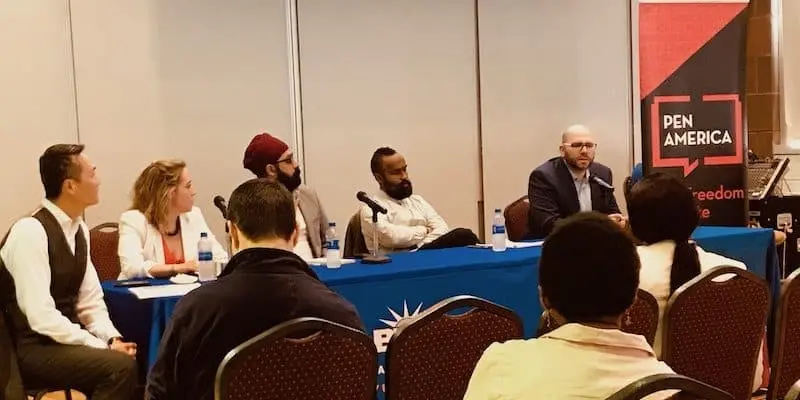When Free Speech is in the Job Description: A Conversation
On May 2, 2019, PEN America, in collaboration with the Communication Studies Program at Borough of Manhattan Community College, presented Negotiating Difficult Conversations: When Free Speech is in the Job Description. Chaired by Professor Tzu-Wen Cheng (BMCC), panelists for this event included Jonathan Friedman (PEN America), Emerson Sykes (ACLU), Simran Jeet Singh (writer, educator, and activist), and Merav Ben-Nun (cross-cultural educator and social activist).

The panel brought together professionals from different fields—higher education, media advocacy, and law—to talk about the role free speech plays in their work. Panelists focused on the practical work of engaging across lines of difference and the challenges that come with deep disagreement.
Each panelist spoke at length about their own personal experiences and how these had informed their work. They emphasized the importance of patience and empathy when engaging with others, and of resisting the instinct to think of ideological opponents in terms of stereotypes. This is not easy work, and everyone seemed to agree that there are times when it is okay to walk away; times when dialogue is no longer possible. The goal should not be to get everyone to listen, they stressed, but to make the best of the conversation when both parties have already done the work of pulling up a chair.
Okay, so you’re at the table, what’s next?
According to the panelists, navigating lines of difference is a careful balancing act. They explained that you need to both focus on understanding the perspective of the person you’re talking to, while also taking the time to present your own views.
Singh suggested being open and vulnerable to help build the trust needed for moments of more intense disagreement, explaining, “You can’t lecture your way into people’s hearts.” He shared that in his experience, “connecting with people and meeting them where they are is far more effective and meaningful.”
Ben-Nun advised that using parallel examples that live outside the immediate context of the conflict or disagreement can help avoid needlessly pressing on people’s sensitivities. She explained that this can be a first step before approaching the immediate conflict.
In another moment, Sykes highlighted the typical conflation between listening and agreement, asking “If I even entertain or consider the hateful ideas that this person has to say, am I complicit in their ideas?” This fear, he explained, so central to why we avoid difficult conversations, can be assuaged by a renewed appreciation for disagreement. “Hateful ideas have real power and we should fight them vigorously. At the same time, we don’t have to agree on everything to engage in dialogue.”
Friedman added that while there are personal risks to entering into a conversation with someone with whom you deeply disagree, “there are also risks to disengagement,” such as greater polarization and misunderstanding. He talked about his own efforts to view others as complicated individuals that don’t fit into neat categories or boxes and call out stereotypes when they’re invoked in conversation.
The event closed with a lively Q&A with the audience of students and faculty from BMCC.






